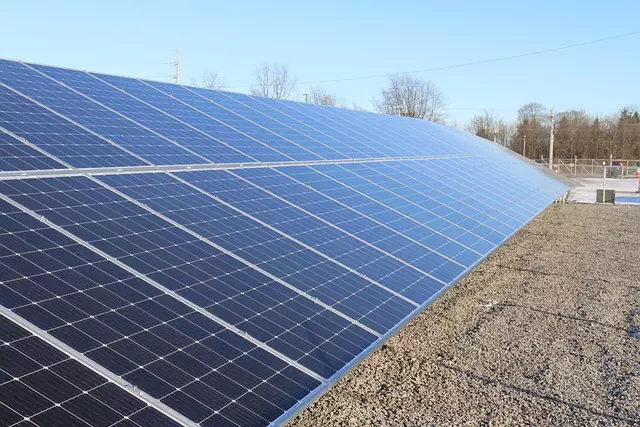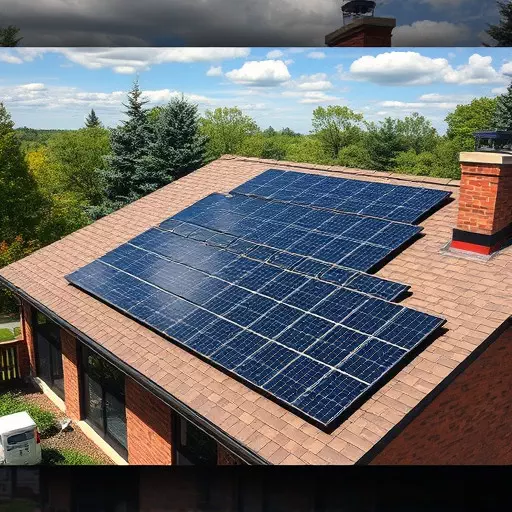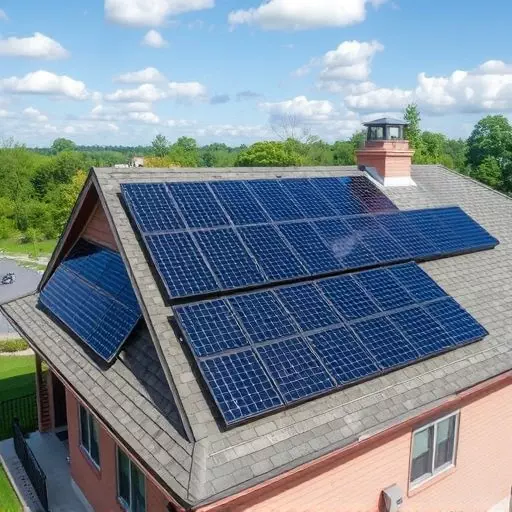Solar roofing systems in Appleton, Wisconsin, are gaining popularity for their integration of photovoltaic (PV) panels, enhancing structural integrity against harsh weather. These systems offer weight distribution, durable materials, protective layers, and seals to prevent water damage. Regular maintenance, inspections, cleaning, ventilation analysis, and monitoring energy production are crucial for optimal performance. The future of roof structural integrity in Appleton and beyond is being transformed by these innovative technologies, promoting environmental sustainability and long-term savings.
Roof structural integrity is the unsung hero of safe and secure housing. It’s the foundation upon which our homes stand, protecting us from the elements above. This article delves into the crucial concept of roof integrity, exploring its significance in residential construction. We’ll uncover how solar roofing systems, like photovoltaic panels installed in Appleton, Wisconsin, contribute to enhanced structural strength. Additionally, we’ll guide readers through signs of damage, maintenance best practices, and future trends shaping this vital industry.
- Understanding Roof Structural Integrity: The Foundation of Safe Housing
- The Role of Solar Roofing Systems in Strengthening Structure
- Appleton, Wisconsin: A Case Study on Integrating Photovoltaic Panels
- Common Signs of Roof Damage and When to Act
- Best Practices for Maintaining Solar Roofing Systems
- Future Trends: Enhancing Structural Integrity with Innovative Technologies
Understanding Roof Structural Integrity: The Foundation of Safe Housing
Roof structural integrity is the cornerstone of safe and secure housing. It involves the strength, stability, and longevity of a roof system, ensuring it can withstand various environmental conditions, from high winds and heavy snowfall to intense sunlight and changing temperatures. In Appleton, Wisconsin, where homeowners increasingly opt for solar roofing systems, understanding this integrity becomes even more vital. These innovative solar roofing systems incorporate photovoltaic (PV) panels that not only generate clean energy but also require a robust structure to support their weight and protect them from damage.
A strong roof structure is essential for the overall safety and value of a home. It protects occupants from potential hazards, prevents water intrusion that can lead to costly mold issues or structural damage, and ensures outdoor elements don’t compromise the interior environment. For homeowners considering solar roofing systems Appleton residents have come to trust, understanding how these advanced PV panels integrate into a robust roof structure is key to making an informed decision. This integration not only enhances energy efficiency but also contributes to long-term savings and environmental sustainability.
The Role of Solar Roofing Systems in Strengthening Structure
In recent years, the integration of solar roofing systems has emerged as a powerful strategy to enhance the structural integrity of buildings in Appleton, Wisconsin, and beyond. These innovative systems go beyond traditional roofing by incorporating photovoltaic (PV) panels that not only provide clean energy but also contribute significantly to the overall strength and durability of a structure. By strategically placing these panels on rooftops, architects and builders can create a robust defense against environmental elements, such as strong winds and harsh storms, which are common in Wisconsin’s climate.
The key advantage lies in the weight distribution and material choices offered by solar roofing systems. The PV panels, made from lightweight yet sturdy materials, are designed to withstand heavy loads without straining the roof structure. Moreover, the protective layers and seals integrated into these systems safeguard against water penetration, preventing potential leaks that could compromise the building’s integrity over time. This dual functionality of energy generation and structural reinforcement makes solar roofing a game-changer for property owners seeking both environmental sustainability and robust roof performance in Appleton, Wisconsin.
Appleton, Wisconsin: A Case Study on Integrating Photovoltaic Panels
Appleton, Wisconsin serves as a prime example of how integrating photovoltaic (PV) panels into roof structural integrity can revolutionize both energy efficiency and sustainable building practices. The city’s diverse climate presents unique challenges for roofing systems, but it also offers an ideal testing ground for advanced solar technologies. By adopting solar roofing systems Appleton Wisconsin residents and businesses are not only reducing their carbon footprint but also enhancing the durability and longevity of their structures.
This Midwestern town has witnessed a surge in the installation of PV panels on residential and commercial rooftops. These solar roofing systems are meticulously designed to complement existing architectural styles while harnessing the power of sunlight. The case study of Appleton highlights the seamless integration of photovoltaic panels into roof structures, demonstrating that sustainable energy solutions can be both aesthetically pleasing and highly functional. This trend sets a precedent for other urban centers, encouraging them to embrace renewable energy sources as a viable and beneficial component of modern roofing infrastructure.
Common Signs of Roof Damage and When to Act
Roof damage can often go unnoticed until it becomes a significant issue, impacting both structural integrity and energy efficiency. At the first sign of trouble, homeowners in Appleton, Wisconsin, should act swiftly to prevent further complications, especially when considering the benefits of solar roofing systems. Common indicators include missing or damaged shingles, visible water stains on interior ceilings or walls, and unexpected leaks during rainfall. If you notice any of these signs, especially after severe weather events, it’s time to inspect your roof thoroughly.
Homeowners with photovoltaic (PV) panels installed should pay extra attention to any changes in their energy production. A drop in efficiency could point towards panel damage or loose connections. Regular maintenance checks, along with prompt repair or replacement of damaged components, are crucial for maintaining the longevity of solar roofing systems and ensuring optimal performance of photovoltaic panels.
Best Practices for Maintaining Solar Roofing Systems
Maintaining solar roofing systems in Appleton, Wisconsin, requires a combination of regular inspections and proactive care to ensure their longevity and optimal performance. Start by scheduling periodic checks with professionals who specialize in solar installations. These experts can inspect for any signs of damage, loose connections, or wear and tear on the photovoltaic (PV) panels and surrounding components. Regular cleaning is also crucial; debris buildup can hinder energy generation, so keep the system free from leaves, dirt, and other contaminants.
Additionally, protect your solar roofing investment by ensuring proper ventilation and shading. Ventilation helps regulate temperature, preventing excessive heat that could impact panel efficiency. Shading analysis should be conducted to identify any obstructions casting shadows on the panels during various times of the day and year, as this can also reduce energy production. Regular maintenance not only keeps your solar roofing system efficient but also extends its lifespan, contributing to sustained energy savings in Appleton, Wisconsin.
Future Trends: Enhancing Structural Integrity with Innovative Technologies
The future of roof structural integrity is being reshaped by innovative technologies, particularly in the realm of solar roofing systems Appleton Wisconsin is embracing. As the world shifts towards sustainable energy solutions, solar roofing systems are not only becoming more popular but also a key component in enhancing structural integrity. These advanced systems integrate photovoltaic panels seamlessly into roofing designs, offering both aesthetic appeal and functional benefits.
By leveraging cutting-edge materials and engineering, solar roofing systems can withstand extreme weather conditions while providing long-term stability and durability. Additionally, the integration of smart technology allows for real-time monitoring of structural health, enabling proactive maintenance and repairs. This trend not only ensures the safety and longevity of buildings but also contributes to a more environmentally friendly approach to construction and energy consumption, particularly with the widespread adoption of solar roofing systems in Appleton Wisconsin and beyond.


